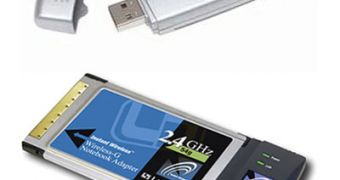Ralink Technology announced the launch of the RT2700 802.11n 1T2R, the shorthand for one transmit, two receive, chipset that comes packed as a mini add-on card compatible with the new PCIe 1x expansion slot. Because of its compliance with the PCIe standard, the mini expansion card can be used on both mobile computing systems as well as desktops and it offers a complete coverage of the 802.11n wireless standard at a lower price tag, and which is similar to the older 802.11b/g compliant solutions.
The wireless chipset RT2700 can be included in add-on cards for notebooks and desktop computer systems that are certified against the 802.11n draft 2.0 standard, while supporting the latest and most important features like "802.11i security, including Wi-Fi Protected Setup and 802.11e quality of service (QoS) which can prioritize voice and video over data transfers". The wireless chipset from Ralink uses a dedicated 1T2R internal architecture that is capable of sustaining data transfer rates up to 300 Mbps downstream and 150 Mbps upstream PHY rates. As the R2700 wireless chip has only one transmitter, the upload speed is somewhat smaller, but this also translates into decreased materials and manufacturing costs as well as a lower price tag for the end customer.
"The RT2700 chip shows Ralink's commitment to deliver cost-effective, robust solutions that drive mainstream Wi-Fi adoption," said Rick Jeng, Executive Vice President of Ralink Technology who was cited in a company's press release concerning the launch of the RT2700 wireless chip. "While Ralink is enjoying tremendous growth of our high performance draft 802.11n-based MIMObility? solutions by leading Notebook and desktop PC manufacturers, we recognize an additional demand for Wi-Fi connectivity beyond 802.11b/g across the growing value Notebook and PC segments."
In order to ensure a wireless connectivity without compatibility issues, the Ralink RT2700 chip is backward compatible with the older wireless standards like 802.11a, 802.11b and 802.11g. Currently, the chip is supported by Microsoft's Windows Vista through a manufacturing company supplied driver.

 14 DAY TRIAL //
14 DAY TRIAL //